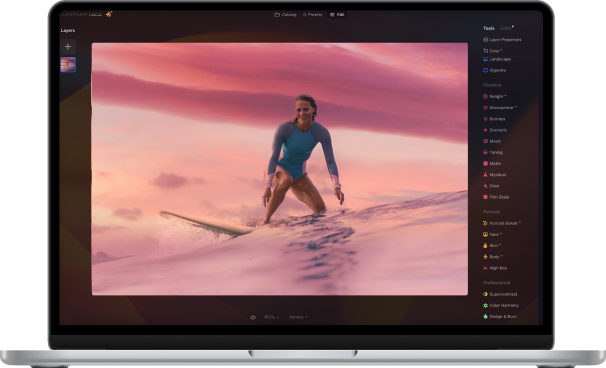How to Unblur an Image Online: on Desktop & Mobile
October 21
10 min. to read
Image clarity is critical to capturing and conveying the details and emotions of a moment. Blurry photos can hide important information and even completely spoil a great picture. In the past, photographers had to put up with this, but now we have many photo editors with the functions of fixing blurry photos.
You can instantly remove blur and give your photos the clarity you want. Online tools are now available for desktop and mobile users to improve their images. These platforms use advanced algorithms and artificial intelligence technologies to enhance blurry photos. With their help, we will figure out how to make a photo less blurry.
Understanding Image Blurring: A Cheat Sheet
 Before discussing how to unblur an image, let's understand this phenomenon and how it occurs.
Before discussing how to unblur an image, let's understand this phenomenon and how it occurs.
- Motion - It occurs when the camera or subject moves during the exposure, resulting in a banding or blurring effect in the image.
- Focus - It occurs when the camera fails to properly focus on the subject, often resulting in a soft or blurry appearance.
- Gaussian - It can occur naturally when the lens's focus is set in a plane other than the subject. However, photographers often intentionally use it as a stylistic effect in photography and digital editing.
- Lens - Blurring is caused by imperfections in the camera lens, such as aberrations, which can make certain parts of the image look less sharp.
- Zooming - Zooming in or out during exposure causes radial lines to appear from the center of the image.
Unblurring Images on Desktop
Discover the 10 best tools for sharpening to know how to fix blurry pictures. Almost every popular photo editor has image sharpener functions. The step-by-step instructions are usually similar, and the process itself is not complicated, especially if you use a photo editor with AI tools to remove blur and noise. Let's compare popular desktop tools for image unblurring, for example.
Photoshop
 Photoshop has a wide range of techniques and features for unblurring images, including:
Photoshop has a wide range of techniques and features for unblurring images, including:
Unsharp Mask.
Smart Sharpen.
Shake Reduction.
High Pass Filter.
Camera Raw Filter.
Here are some tips for getting the best results:
Always work with duplicate layers to preserve the original image.
Carefully adjust the radius and magnitude in the Unsharp Mask and Smart Sharpen tools to avoid over-sharpening.
Use the Reduce Noise in the Smart Sharpen or Camera Raw filter to control graininess.
Learn more about How to fix grainy photos.
Steps: How to unblur a photo in Photoshop
Launch Photoshop and open the needed file.
Duplicate Layer.
Apply Smart Sharpen.
Fine-Tune with Unsharp Mask.
Finalize with a High-Pass Filter.
Adjust and Save.
Luminar Neo
 Luminar Neo has a range of features specifically designed for unblurring. You can use them according to your preferences and needs:
Luminar Neo has a range of features specifically designed for unblurring. You can use them according to your preferences and needs:
Unblur Image tool reduces subject blur caused by motion, out-of-focus, or camera shake.
Structure AI enhances details selectively.
Super Contrast allows precise control over highlights, midtones, and shadows.
Accent AI is a one-click tool for instant image enhancement.
Enhance AI fine-tunes for clearer photos.
Here is a guided tutorial on using Luminar Neo for image enhancement and tips for best results:
Start with subtle adjustments and gradually increase the sliders.
Use masking and selective adjustments.
Experiment with AI tools to save time and create images according to your creative vision.
Steps: How to unblur photos in Luminar Neo
Import a needed file in Luminar Neo on your computer or use an online photo editor.
Apply AI-powered enhancement sliders for quick overall improvements.
Adjust Super Contrast.
Improve image quality with Noise Reduction.
Go to the Details Enhancer section and adjust small, medium, and large details.
Final Touch and Export.
Unblurring Images on Mobile
 While mobile apps offer convenience, their approach to blurring may differ from desktop tools in terms of user interface and features. Differences in approach between desktop and mobile devices include a different interface and corresponding feature sets. Desktop editors have more advanced functionality and improved AI tools. Desktop apps can handle higher resolutions and more complex edits, while mobile apps can be optimized for faster, less resource-intensive operations. Mobile apps also offer on-the-fly editing, making them ideal for quick fixes and immediate sharing, while desktop tools are better suited for detailed, high-quality editing.
While mobile apps offer convenience, their approach to blurring may differ from desktop tools in terms of user interface and features. Differences in approach between desktop and mobile devices include a different interface and corresponding feature sets. Desktop editors have more advanced functionality and improved AI tools. Desktop apps can handle higher resolutions and more complex edits, while mobile apps can be optimized for faster, less resource-intensive operations. Mobile apps also offer on-the-fly editing, making them ideal for quick fixes and immediate sharing, while desktop tools are better suited for detailed, high-quality editing.
For iPhone
Here is a short overview of some apps and tools available for iPhone Users:
Luminar for iPhone. The mobile version of the desktop photo editor from the Skylum developer has all its features and preferences.
Snapseed. A free app by Google that offers powerful editing tools, including sharpening features.
Adobe Lightroom Mobile. Provides advanced sharpening and clarity tools.
Fotor. Offers basic image enhancement and sharpening tools.
Step-by-Step Instructions Tailored for iOS Devices
Steps: How to make a blurry picture clear on iPhone
Go to the App Store, search for your chosen app (e.g., Snapseed, Luminar Neo) and install it.
Open the app and import the picture.
Apply Sharpening Tools (e.g., Snapseed).
Adjust the Structure and Sharpening sliders to enhance image clarity.
Use AI enhancements (e.g., Luminar Neo).
Fine-tune other settings, such as brightness and contrast, to complement the sharpening effect.
Preview and Save the Image.
For Android
Here is a short guide to the best Android apps for sharpening images
Snapseed. Similar to its iOS counterpart, it offers robust editing and sharpening tools.
Remini. An AI-based app that enhances and clarifies images.
Adobe Lightroom Mobile. Provides professional-level sharpening and clarity adjustments.
Photo Editor Pro. Offers various tools for enhancing and sharpening images.
Take into consideration these customized tips for effective use on Android platforms:
Ensure the app supports your device’s OS version for optimal performance.
Utilize built-in tutorials to get the most out of the features.
Steps: How to fix blurry pictures on Android
Open the Google Play Store, search for your selected app (e.g., Snapseed, Remini), and install it.
Launch the app and import the picture.
Apply Sharpening Tools (e.g., Snapseed).
Adjust the Structure and Sharpening sliders to improve the image’s clarity.
Use AI Enhancements (e.g., Remini).
Adjust other settings like exposure and contrast to enhance the sharpened image further.
Review and Save.
Tips and Tricks for Best Results
 General Tips
General Tips
Use the best resolution available for clearer results.
Apply changes gradually to avoid over-sharpening and artifacts.
Regularly check before/after views to assess improvements.
Sharpening should be used with noise reduction and contrast adjustments for a balanced effect.
Apply changes to specific areas rather than the entire image for better control.
Common Mistakes to Avoid
Too much sharpening can cause halos and noise.
Ignoring Noise Reduction.
Over-Relying on AI Tools
Neglecting Image Context.
Conclusion
By understanding the main causes of blurred images, you can learn how to prevent them. Having understood the work of photo editors, you can quickly and effectively correct this defect, saving successful shots. A comparison of different platforms, such as Photoshop and Luminar Neo, shows that each photo editor can take other approaches.
When sharpening an image, always start with the highest-quality source, use the tools gradually, and avoid over-sharpening. For optimal results, combine different tools and techniques. These techniques will help you get sharper and more perfect images and save your photos from unwanted effects.



 General Tips
General Tips

